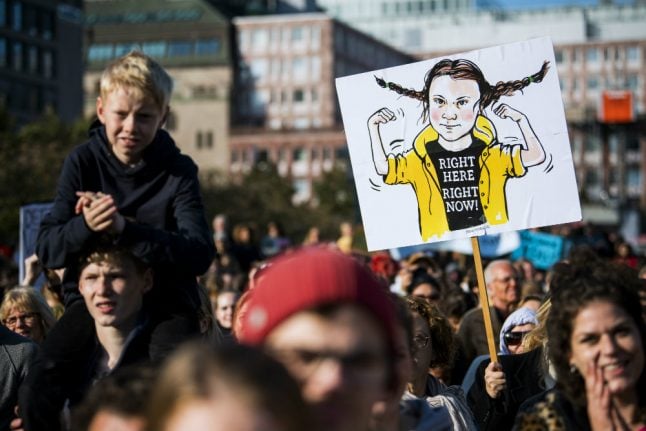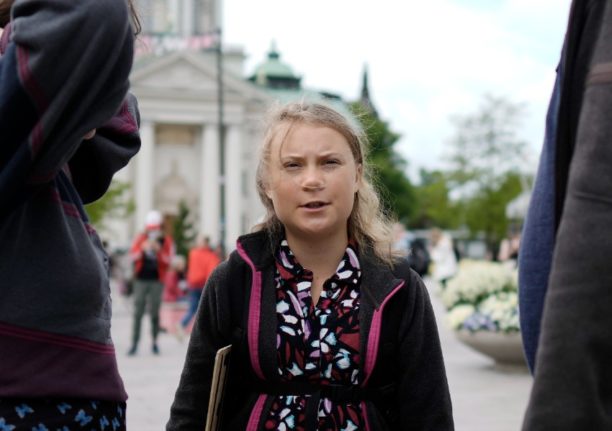The 16-year-old has already received Amnesty International's top honour and the Right Livelihood Award, sometimes dubbed the “alternative Nobel”, and online betting sites like Ladbrokes now put her as favourite to win what is perhaps the world's most prestigious prize.
In an interview with Swiss broadcaster RTS in August, Thunberg stressed that while the award would be “a recognition for this movement,” she and her supporters weren't “doing this to get awards and prizes.”
In August last year, she began sitting alone in front of Sweden's parliament on Fridays with a sign reading “School Strike for the Climate”.
In a little more than a year, she has galvanised millions of young people around the world to take part in demonstrations to raise awareness for action on climate change.
She made global headlines in late September when she lambasted world leaders at the UN climate summit in New York.
“How dare you? You have stolen my dreams and my childhood with your empty words,” she told them, holding back tears.
READ ALSO: 'How dare you?' How Greta Thunberg started a global climate movement
But is her impassioned wake-up call enough to earn her the Nobel Peace Prize?
“Extremely unlikely,” Henrik Urdal, director of the Peace Research Institute in Oslo (Prio), told AFP, citing two reasons for his scepticism.
He argued that while some say climate change might aggravate conflicts in his view there is still no consensus on whether it is actually the cause of armed conflict. He also said her tender age could make the prize more of a burden than a reward.
“The only way I could see that happen is that she would be part of a shared prize like Malala,” Urdal said, referring to Pakistani activist Malala Yousafzai, who shared the 2014 prize — at age 17 — with Indian children's rights activist Kailash Satyarthi.
Norwegian historian Asle Sveen echoed that view.
“Of course she is now an international star, in conflict with Donald Trump, and she put the searchlight on climate change better than anyone else,” he said.
READ ALSO: Greta Thunberg mocks jibes by Vladimir Putin and Donald Trump
“What's against her is that she is only 16 years old,” he continued, adding that he would be “very surprised” if she got the award.
But Dan Smith, director of the Stockholm International Peace Research Institute (Sipri), believes Thunberg should be considered a “serious candidate” and that climate change is linked to conflict.
“First of all, I think that what she has done over the past year is extraordinary,” Smith told AFP.
“I think that climate change is an issue which is strongly related to security and peace.”
READ ALSO: From the archive: The Local's first interview with Greta Thunberg
Experts think a more likely candidate would be Ethiopian Prime Minister Abiy Ahmed, who made peace with bitter foe Eritrea.
“Abiy Ahmed would be a good candidate, as his tenure has had peace-inducing effects in the country and on the region,” said Peter Wallensteen, professor of Peace and Conflict Research at Sweden's Uppsala University.
Predicting the winner is always a challenge since the Norwegian Nobel Committee never reveals the names of the nominees. All that is known is that a total of 301 individuals and organisations have been nominated this year.
Experts also suggest that the five-person committee could this year decide to focus on freedom of expression and information, at a time when such freedoms are under pressure in both democracies and authoritarian regimes.
“In the age of fake news and information overload… and the lack of transparency, the lack of accountability in many political processes, this is something that I would hope the committee would take very seriously and consider,” Urdal said.
Press organisations such as Reporters Without Borders (RSF) or the Committee to Protect Journalists (CPJ) could then be possible winners.
As the migration crisis continues to dominate the political agenda, the UN refugee agency UNHCR and its head Filippo Grandi, as well as the organisation SOS Mediterranee, are also seen as potential winners.
Broadly considered a controversial long shot, US President Donald Trump has nonetheless been mentioned for his efforts to mend old wounds with North Korean leader Kim Jong Un.
The 2019 laureate will be revealed on Friday at 11am at the Nobel Institute in Oslo.
Last year, the award — consisting of a gold medal, a diploma, and nine million Swedish kronor — was given to two champions fighting sexual violence, Congolese gynaecologist Denis Mukwege and Yazidi activist Nadia Murad.
READ ALSO: Greta Thunberg receives Amnesty's top human rights award



 Please whitelist us to continue reading.
Please whitelist us to continue reading.